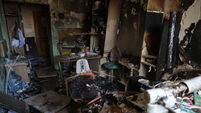How kleptocrats hide their ill-gotten gains in Ireland and Britain

In 2019, the US Department of Justice brought bribery charges against Gulnara Karimova, the daughter of the former president of Uzbekistan, alleging she had received around $1bn in corrupt payments from telecoms companies.
Kleptocracy — literally “rule by thieves”, where a leader corruptly steals their country’s wealth — is not a new concept. Rulers, both ancient and modern, have exploited their position to siphon off public assets, entrenching their power through corruption and repression. Yet what is a relatively new phenomenon is how modern-day kleptocrats are able to utilise a transnational network of professional enablers located in the West — wealth managers, real estate agents, lawyers — to extract money and maintain power.
As a result, a lot of this corrupted wealth makes its way from kleptocracies to democracies like Ireland and Britain. In 2019, the US Department of Justice brought bribery charges against Gulnara Karimova, the daughter of the former president of Uzbekistan, alleging she had received around $1bn in corrupt payments from telecoms companies, with up to $300m frozen in a bank account in Dublin.
















